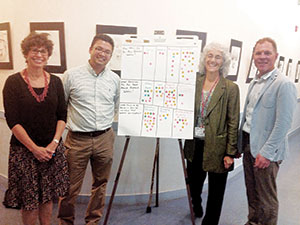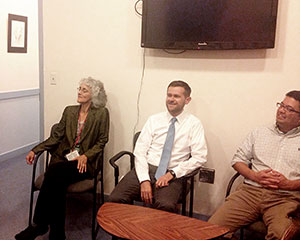Educating the Somerville community about tap water
*

The organizers of the event (L to R): Wendy Blom (Director of SCATV), Oliver Sellers-Garcia (Office of Sustainability), Lisa Brukilacchio (Somerville Community Health Agenda), and David Hudson (Director of Shape Up Somerville).
By Gabriela C. Martinez
Last Thursday, Somerville Community Access Television (SCATV) held a film screening and panel discussion aimed at debunking the common myths about tap water in Somerville and raising awareness about the environmental effects of consuming bottle water.
This program, which is the product of a partnership between Shape Up Somerville, SCATV, The Somerville Community Health Agenda, National Water Resources Authority (MWRA), and The Office of Sustainability and Environment, was funded by Mt. Auburn Hospital in the form of a Community Health Network Area (CHNA) Grant.
The Somerville Tap Water Initiative will engage the community through promotion and education and will also strive to effect change through policy work in the institutional level and the installment of infrastructure, such as water fountains and hydration stations.
“The reason this came about is that we have been hearing a lot in the community that the are many misperceptions about bottle water. Many of the people that we serve in Somerville are spending money on bottle water – and money that they don’t necessarily have. Most of these people are struggling to pay for food and rent. This is why we wanted to get the message out about the importance of drinking tap water,” said David Hudson, the director of Shape Up Somerville and one of the event’s organizer.

The panel ( L to R): Lisa Brukilacchio, Joshua Das, Oliver Sellers-Garcia.
Upon arriving, members of the community were invited to participate in a survey about the best policies for making tap water more accessible for everyone. Before settling into their seats, the attendees were offered coffee, popcorn, and, of course, tap water.
The screening was comprised of four videos. The first clip, featuring the comedian Jimmy Tingle espousing the benefits of tap water, served as a humorous introduction for an incisive, eight-minute video called The Story of Bottle Water.
Part of an online series created by the Story of Stuff Project, The Story of Bottle Water examines the strategies the bottle water industry use to manufacture demand for their product. Such strategies include convincing people that tap water is unsafe and using images of idyllic landscapes and environmentally-themed advertising on water bottles.
This short, educational film was followed by a blind taste-testing filmed by SCATV. The tasting was a collaboration between Shape Up Somerville, SCATV, and the Cambridge Health Alliance (CHA) and was held last August at the Somerville Union Square Farmers’ Market. Out of the 102 people who took the tests, 77 preferred Somerville Tap, while 51 opted for the bottle water.
The last short film was an in-depth documentary about the Quabbin Reservoir in Central Massachusetts, which is Boston’s primary water supply. The film also documents the various tests and treatments administered by the MWRA before delivering tap water to the community.
The films were followed by a panel discussion led by Lisa Brukalacchio, the Director of the Somerville Community Health Agenda; Oliver Sellers-Garcia, the Director of Sustainability and Environment at City of Somerville; and Joshua Das from the MWRA. The event organizers also contacted Coca-Cola and Poland Springs to solicit their participation in the panel, but did not receive a response to their invitation.
The panel served as a forum for members of the Somerville community to discuss their views on the quality of tap water in Somerville. Some members of the community voiced concerns about lead, which can get into tap water through lead-based pipes that often found in older houses. Mr. Sellers-Garcia stated that all of the pipes that carry water into the community are mostly made out of iron and steel and do not add lead into the water.
The conversation also highlighted the importance of educating newly arrived immigrant communities about the quality of tap water.
“We are particularly trying to get the word out to non-English speakers or immigrants who might come from someplace where you can’t take for granted that you can drink the water. If you come here, why would you just assume that it’s OK to drink the water without some kind of educational process?” Lisa Brukilacchio answered, when asked why the initiative to promote bottle water was important.
As part of their effort to promote the use of bottle water among immigrant communities, the program will be hosting another Tap Water 101 Film Screening and Dialogue in October that will target the Spanish, Haitian, and Portuguese-speaking communities in Somerville.















Reader Comments